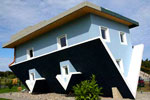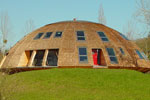It may resemble a giant Jenga game. But to Japanese architect Sou Fujimoto his wooden bungalow (photo, above) represents the next generation of home design.
The primary qualities of Fujimoto’s vision: minimalism, compact design, harmony with surroundings and multi-use spaces.
Continue →
There’s a scene in The Simpsons in which a cartoon rendering of architect Frank Gehry casually tosses a piece of paper onto the ground, gives it a look and then says to himself “Frank, you genius! You did it again!”
That joke is probably funnier seeing it than reading our recounting. And it’s certainly funnier if you are familiar with certain Gehry-designed buildings—like the Walt Disney Concert Hall in L.A., the Experience Music Project in Seattle and, especially, Bilbao Spain’s Guggenheim Museum—which really do bear some resemblance to crinkled paper (if you squint a little).
Continue →
˙uʍop ǝpısdn plɹoʍ ǝɥʇ uɹnʇ ʇɐɥʇ—puɐloԀ puɐ ɐıɹʇsn∀ ‘˙∀˙S˙∩ ǝɥʇ ‘ʎuɐɯɹǝפ ‘ɐpɐuɐƆ ‘uıɐdS uı—sǝɹnʇɔnɹʇs uǝʌǝs ǝsǝɥʇ ɟo puoɟ ʎllɐıɔǝdsǝ sı ɟɟnʇS looƆ ʇodS ʎɥʍ sı ɥɔıɥM ˙ʎʇılɐǝɹ uo ǝʌıʇɔǝdsɹǝd ɹnoʎ ǝƃuɐɥɔ uɐɔ ʎǝɥʇ :ǝɹnʇɔǝʇıɥɔɹɐ puɐ lǝʌɐɹʇ ɥʇoq ɟo ʇɔǝdsɐ looɔ ǝuO
Continue →
There are advantages to living in an all-glass house: the views, the natural sunlight, the passive solar heating on chilly sunny days. There are disadvantages too: the lack of privacy, the unwanted extra heat on warm days, the common wisdom ban on throwing stones while living in one. So what’s a home owner to do?
If you are Ross Russell of Suffok, England the answer is: Build a house that slides open.
Continue →
Shipping containers. You’ve seen them on trains, on the back of trucks, at ports and piled onto cargo ships. There more than 20 million of those steel 40 by 8 feet (12 by 2.4 meter) boxes scattered around the world. That’s more than were needed even before the current economic slowdown. Today, as many as one million shipping containers may be sitting around unused. The surplus is especially profound in the United States, northern Europe and China.
Given the planet’s excess of shipping containers and shortage of affordable housing it only makes sense that people would make the connection. “Container architecture” has become a specialty in itself. The benefits are obvious: Containers are relatively cheap (around US$1,200~1,500 each). They are, by definition, portable. And they are durable (made to survive rough treatment and resist salt corrosion). A container house can be built, on average, 40% faster than a comparably sized traditional house. And then there’s the environmental benefit of putting surplus containers to use instead of letting them slowly rust in a landfill.
Thousands buildings made of shipping containers are today being uses for offices, stores, restaurants and private residences. There are several excellent books documenting the most interesting among them. Here are five shipping container buildings we think are especially cool:
Continue →
Visit a Harmonique Domespace house and you’ll instantly take note of its sleek, curved exterior and the wood-laden interior filled with skylights and dramatic ceilingscapes. But here are some things you won’t notice, at least not right away:
• The entire house rotates! The rotation is so smooth and gradual as to be imperceptible from both inside and outside the house (imagine trying to see the movement of an hour hand on a watch). The dome owner can direct the house to point in a particular direction by use of a remote control. But primary purpose of the rotation is to make optimal use of the solar panels that line the roof of the Domespace and the passive solar properties of the house’s many windows. Which brings us to . . .
Continue →
For sale:
Secret cave dwelling. 3 bedroom. 2 bath. Perfect for an evil genius’s impregnable fortress or headquarters for league of superheros. Gorgeous kitchen. Spacious quarters for army of minions.
You know these are tough economic times when even Bruce Wayne-types have taken to selling knickknacks on eBay to raise a little extra money. Knickknacks like, say, a stamp collection. Or an antique pitcher. Or a 15,000 square foot house built into a cave.
Continue →
Snails seem to be happy living in their shells. So why can’t people? Happily live in oversized snail shells, that is.
That’s what a couple in Naucalpan, Mexico wondered. They contracted the architectural firm Senosiain Arquitectos, the firm came up with some sketches of what a snail-house might look like and soon the Nautilus House was born. (See some of their design sketches, and photos, after the jump).
Continue →


























